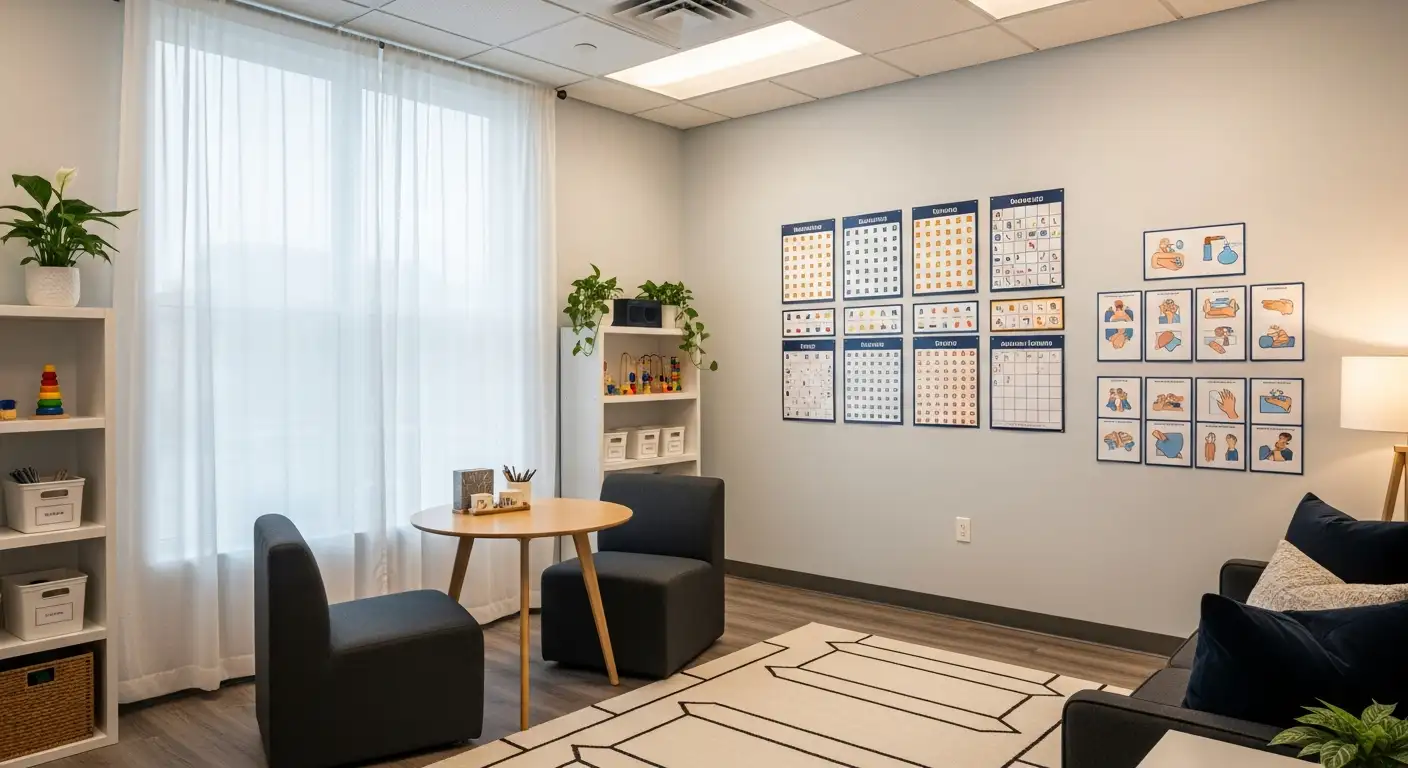Speech Therapist Certification


Understanding the Foundation of Speech Therapy Certification
Embarking on a career in speech-language pathology requires comprehensive certification that verifies expertise and ethical practice. This article explores the core standards, educational pathways, procedural steps, and ongoing requirements essential for aspiring and practicing speech therapists to achieve and maintain certification.
Core Certification Requirements and Standards in Speech-Language Pathology

What are the certification requirements and standards for speech therapists?
To become certified as a speech-language pathologist through the American Speech-Language-Hearing Association (ASHA), candidates must fulfill several essential requirements. First, applicants need to earn a graduate or postgraduate degree in speech-language pathology from an accredited institution, ensuring their education meets the required academic standards.
Next, candidates are required to complete a supervised clinical fellowship, known as the Clinical Fellowship (CF), which typically lasts at least 36 weeks and involves at least 1,260 hours of direct clinical experience. This practical training is crucial for developing the skills needed for independent practice.
Additionally, passing the Praxis Examination in Speech-Language Pathology, developed and administered by ASHA, is a mandatory assessment of clinical knowledge and competence. Applicants must submit their Praxis scores along with official transcripts and clinical experience verification during the application process.
Other application components include disclosure documents, if applicable, and payment of application fees. Once certified, maintaining the credential involves completing 30 hours of professional development every three years, including courses on ethics and diversity, to stay current with the latest practices.
While ASHA’s certification (CCC-SLP) is widely recognized nationwide, state licensure requirements, such as New York’s, may include additional criteria like specific coursework, clinical hours, and passing the Praxis II with a minimum score of 162.
For those seeking advanced practice, specialty certifications like BCS (Board Certified Specialist) in areas such as child language, swallowing, or fluency are available. These recognize specialized expertise beyond the general certification and often require prior CC-CCC certification and additional training.
Overall, the pathway to becoming a licensed and certified speech-language pathologist involves rigorous education, clinical training, examination success, and ongoing professional development to ensure high standards of service for clients.
Educational Pathways to Speech Therapy Certification

What educational pathways are available for becoming a certified speech therapist?
Becoming a certified speech therapist involves several educational steps that ensure individuals acquire the necessary knowledge and practical skills. The typical pathway starts with earning a bachelor's degree that relates to communication sciences, psychology, or education. These foundational programs prepare students for advanced study in speech-language pathology.
The next step is enrolling in a master's program accredited by the Council on Academic Accreditation (CAA) in Audiology and Speech-Language Pathology. During graduate studies, students complete at least 400 hours of supervised clinical practicum. This hands-on experience includes direct client contact, case management, and indirect services, which are crucial for developing clinical competency.
Following graduation, candidates are required to undertake a clinical fellowship (CF) lasting a minimum of 36 weeks, totaling approximately 1,260 supervised hours. This fellowship provides practical, mentored experience in real-world settings, allowing candidates to refine their skills under the supervision of licensed professionals or ASHA-certified practitioners.
Once the clinical fellowship is successfully completed, candidates must pass the Praxis Examination in Speech-Language Pathology, administered by Praxis and Educational Testing Service (ETS), with a minimum passing score of 162.
The final step involves obtaining the Certificate of Clinical Competence in Speech-Language Pathology (CCC-SLP) from the American Speech-Language-Hearing Association (ASHA). Many states also require licensure, which may have additional educational or examination requirements based on local regulations.
Alternative Pathways
For speech-language pathology assistants aiming to advance their careers, alternative pathways exist. These typically involve completing specific coursework, accumulating supervised clinical hours, and obtaining additional supervision according to ASHA standards. These pathways enable qualified support personnel to progress toward full certification.
| Pathway Type | Educational Requirement | Supervised Experience | Certification / License | Notes |
|---|---|---|---|---|
| Bachelor's Degree | Communication sciences, psychology, education | N/A | Support role | Entry into field, minimum for graduate programs |
| Master's Degree (CAA-accredited) | 75 semester hours, including practicum | 400+ hours | CCC-SLP | Core requirement for certification |
| Clinical Fellowship (CF) | N/A | 36 weeks (1,260 hours) | CCC-SLP | Practical experience after master's degree |
| State Licensure | Varies by state | Varies, often included in CF | State license | Ensures legal authority to practice in specific regions |
| Alternative Pathways | Varies depending on prior experience | Varies | Support roles / licensing | For assistants and international applicants seeking certification |
This structured educational path ensures that aspiring speech-language pathologists are well-prepared for professional practice and meet all certification standards required across the United States.
Licensure Process for Speech-Language Pathologists

How do you become a licensed speech-language pathologist?
Becoming a licensed speech-language pathologist involves several educational and practical steps to ensure competency and adherence to professional standards.
The process begins with earning a master’s degree in speech-language pathology from an accredited institution. This degree program covers essential coursework in communication sciences, disorders, and professional practice, and includes a supervised clinical practicum totaling at least 400 hours of direct client contact.
Following the academic requirements, candidates must complete at least 36 weeks of supervised clinical experience, which can be part of a clinical fellowship (CF) of at least 36 weeks, amounting to about 1,260 hours. This supervised experience is mentored by a licensed professional, ensuring hands-on skill development in real-world settings.
A critical step in the licensure process is passing the Praxis Series Specialty Area test (Praxis II: Speech-Language Pathology #5331), administered by ETS. Most states require a minimum passing score of 162 to qualify.
Applicants then submit an official application to their state licensing board, including proof of their educational credentials, supervised clinical experience, and exam results. From July 7, 2025, onwards, all applicants must also complete a fingerprint-based FBI background check as part of the background screening.
Once all requirements are satisfactorily met, the licensing board reviews the application, a process that typically takes several weeks. Upon approval, the applicant is granted licensure, allowing practice within the state.
Maintaining licensure involves ongoing professional development, including completing continuing education hours and child abuse recognition training every two years. This ensures practitioners stay current in their knowledge and skills.
The table below summarizes the main steps involved:
| Step | Description | Additional Notes |
|---|---|---|
| Education | Obtain a master's degree in speech-language pathology | Must be from an accredited program |
| Supervised Experience | Complete 36 weeks / 1,260 hours of supervised clinical fellowship | Mentored by licensed professional |
| Examination | Pass the Praxis II: Speech-Language Pathology #5331 | Minimum score of 162 usually required |
| Application | Submit transcripts, exam scores, and experience verification | Includes background check from July 2025 |
| Licensure | Receive license from state board | Subject to renewal and continuing education |
This comprehensive process ensures that individuals are fully prepared and qualified to serve clients as licensed speech-language pathologists.
Procedural Steps in Achieving Speech Therapy Certification

Educational requirements
To start the process, candidates must complete a master’s or higher degree in speech-language pathology from an accredited program recognized by ASHA or one with CAA-candidacy status. The educational curriculum includes at least 75 semester hours covering human communication, professional practice areas, and related content. Additionally, a practicum component with a minimum of 400 clock hours involving direct client contact is required.
Application submission details
Applicants must submit an online application to ASHA, including official graduate transcripts, Praxis exam scores, and any necessary disclosure documents. The application fee varies based on membership status but generally covers the certification review process, which takes around six weeks. Submitting accurate and complete documentation is essential for a smooth review.
Clinical fellowship and supervised experience
Following the educational phase, candidates must complete a Clinical Fellowship (CF) lasting at least 36 weeks and accumulating at least 1,260 hours of supervised clinical experience. During this period, the fellow reports hours worked, and mentors verify clinical activities using specified reports and inventories. Supervision must be provided by a licensed professional in the state or an ASHA-certified CCC holder, especially in settings exempt from typical licensure.
Exam registration and passing
A crucial step is passing the Praxis Examination in Speech-Language Pathology, administered by ETS. Candidates need to register for the exam, prepare thoroughly, and achieve the minimum passing score set by ASHA. This national exam tests comprehensive knowledge of speech-language pathology principles and practices.
Verification and documentation
Throughout the process, candidates need to compile documentation verifying their educational background, clinical experience, and exam results. Mentor reports, clinical hours, and the supervision verification form are critical. Once all requirements are met and verified, ASHA conducts a review of the application. If approved, the applicant receive the CCC-SLP credential, recognizing their qualifications to practice as a licensed speech-language pathologist.
| Step | Qualification or Action | Details | Additional Notes |
|---|---|---|---|
| 1 | Educational degree | Master's or higher from an accredited program | Must include practicum hours |
| 2 | Application submission | Online form, transcripts, Praxis scores | Fee required, review takes 6 weeks |
| 3 | Clinical experience | 36 weeks, 1,260 hours with supervision | Reported and verified by mentors |
| 4 | Praxis exam | Registration and passing with minimum score | Developed by ETS, score required |
| 5 | Certification approval | Application review, verification, approval | Post-approval, receive CCC-SLP |
The complete process ensures that speech-language pathologists meet high standards of competence, ethics, and professional practice, ultimately paving the way for a successful career in speech therapy.
Eligibility Criteria and Prerequisites for Certification
What are the eligibility criteria and prerequisites for speech therapist certification?
Getting certified as a speech-language pathologist requires meeting several important educational and clinical experiences. First, applicants must hold a master's degree or a higher qualification in Speech-Language Pathology or a related field like Communicative Sciences and Disorders. This degree must be from an accredited program, which ensures the curriculum meets national standards.
The educational program must include at least 400 clock hours of supervised clinical practicum. This hands-on experience is essential for developing practical skills in diagnosing and treating communication disorders. All coursework and practicum hours should be completed before starting the Clinical Fellowship (CF) phase.
The Clinical Fellowship is a critical component of certification. Candidates must complete a minimum of 36 weeks of supervised practice, totaling approximately 1,260 hours. During this time, at least 80% of the hours must involve direct contact with clients, with supervision provided by a licensed, ASHA-certified speech-language pathologist.
Beyond the educational and clinical practicum requirements, candidates must pass the Praxis Exam in Speech-Language Pathology, a national assessment developed by ASHA. Passing this exam demonstrates comprehensive knowledge of speech-language pathology principles.
Candidates also need to submit necessary documentation to fulfill application requirements. This includes official transcripts documenting completed coursework, verification reports of clinical fellowship hours, and mentor reports confirming supervision and performance.
All applications are reviewed under the 2020 Standards for Certification, which are in effect at the time of submission. Applicants can apply once they have completed their graduate degree and practicum hours but must do so before completing the Clinical Fellowship, which is the final required clinical training step.
Types of Speech Therapy Certifications and Their Benefits
What are the different types of speech therapist certifications and their benefits?
The most recognized certification for speech-language pathologists in the United States is the Certificate of Clinical Competence in Speech-Language Pathology (CCC-SLP), offered by the American Speech-Language-Hearing Association (ASHA). This credential signifies a high standard of professional knowledge, skills, and expertise. To earn it, candidates must complete a master’s or higher degree, accumulate at least 400 supervised clinical hours, pass the Praxis exam, and complete a clinical fellowship of at least 36 weeks.
Having the CCC-SLP certification benefits professionals in multiple ways. It often serves as a prerequisite for state licensure and employment in healthcare, schools, and private practice. The certification enhances credibility and offers greater career advancement opportunities.
Beyond the basic certification, clinicians can pursue specialty certifications through ASHA, known as Board Certified Specialist (BCS). These focus on specific areas like child language, fluency, voice, swallowing, or motor speech disorders. Earning a BCS requires additional clinical experience and continuing education, reflecting deeper expertise.
Other specialized credentials include certifications in augmentative and alternative communication, such as PECS (Picture Exchange Communication System), which improves communication for children and individuals with disabilities. Certifications like PROMPT (a tactile-kinesthetic approach for speech and motor control) and LSVT-LOUD (for speech improvement in Parkinson’s disease) are provided by specialized institutes and are essential for clinicians focusing on motor speech disorders.
Acquiring advanced certifications offers numerous benefits: it heightens professional credibility, allows clinicians to expand their scope of practice, and provides the necessary qualifications to deliver specialized, evidence-based interventions. These credentials not only improve patient care but also position clinicians as leaders in their fields.
| Certification Type | Focus Area | Requirements | Benefits |
|---|---|---|---|
| CCC-SLP | General speech-language pathology | Master’s degree, clinical hours, Praxis exam, fellowship | Industry standard, licensure support, employment opportunities |
| BCS (Specialty Certificates) | Specific areas like child language, voice, swallowing | Additional clinical experience, coursework, exams | Expertise recognition, career advancement |
| PECS Certification | Augmentative & alternative communication | Specialized training, practice | Improves communication for clients with communication disorders |
| PROMPT Certification | Motor speech disorders | Tactile-kinesthetic training, practice | Enhanced intervention skills for complex speech issues |
| LSVT-LOUD Certification | Speech in Parkinson’s disease | Training course completion | Specialized treatment for motor speech disorders |
Earning these various credentials helps speech-language pathologists stay at the forefront of their field, ensuring they can provide effective, evidence-based care for a diverse range of communication and swallowing disorders.
Renewal and Maintenance of Speech Therapy Certification
What are the renewal and maintenance requirements for speech therapy certifications?
Maintaining certification as a speech-language pathologist involves fulfilling ongoing education and professional development obligations. Certified professionals must typically earn a specific number of Continuing Education Units (CEUs) or Professional Development Hours (PDHs), often within a three-year cycle. For example, ASHA requires around 30 PDHs over three years, with some of these hours dedicated specifically to ethics, cultural competence, or diversity training.
To stay actively certified, practitioners need to submit a renewal application before their current certification expires. The renewal periods vary, being annual, biennial, or triennial depending on the certifying organization or state licensing requirements.
Documentation of completed CE activities is usually necessary to verify compliance. Professionals should keep records such as certificates of attendance or participation in relevant courses, workshops, or conferences.
Many jurisdictions and certifying bodies also impose additional subject-specific requirements, emphasizing ongoing education in ethics, clinical best practices, or emerging technologies.
Failing to meet renewal obligations can lead to relicensure processes or the loss of certification status. Therefore, it is crucial for speech-language pathologists to monitor certification expiration dates and ensure all renewal requirements are met on time.
As certification standards evolve, professionals should regularly check updates from organizations like ASHA or their state licensing boards to stay informed about any changes that may affect their renewal process and certification maintenance.
Impact of Certification on Career Development
How does certification impact career advancement for speech therapists?
Certification plays a crucial role in shaping the career path of speech therapists. Achieving a professional credential, especially the Certificate of Clinical Competence in Speech-Language Pathology (CCC-SLP) from ASHA, helps establish credibility and proves a therapist’s expertise in the field.
Employers often prefer or require certification when hiring, making it a vital step for securing desirable positions. Certified speech-language pathologists are more likely to access advanced clinical roles, leadership positions, or specialized areas such as swallowing disorders or pediatric communication.
In addition to licensure, obtaining specialty certifications—like those in child language or fluency—can distinguish professionals from their peers, opening further career opportunities.
While certification alone may not lead directly to higher salaries, studies and industry trends show a correlation between certification and increased earning potential. Professionals with recognized credentials can command higher wages and are often considered for more complex, higher-responsibility roles.
Ongoing professional development and maintaining certifications reflect a commitment to excellence. This dedication can facilitate promotions within organizations, enable career transitions into administrative or supervisory roles, and support greater job security. Overall, certification significantly boosts a speech therapist's prospects for professional growth and leadership.
Stepping Into the Future of Speech Therapy
Achieving and maintaining certification as a speech therapist is a comprehensive process that encompasses specialized education, rigorous examinations, supervised experience, and lifelong professional development. These standards ensure that practitioners possess the requisite knowledge, skills, and ethical standards necessary to provide high-quality care. As the field continues to evolve with new treatment modalities and specialty areas, ongoing certification renewals and additional credentials offer opportunities for professional growth, specialization, and leadership. For aspiring speech therapists, understanding and navigating this certification landscape is vital to advancing their careers and delivering impactful patient outcomes.
References
- Audiology and Speech-Language Pathology Certification
- Apply for Certification in Speech-Language Pathology
- License Requirements for Speech-Language Pathology
- Certification & Licensure Requirements
- 8 SLP Certifications That May Help Advance Your Career
- Speech Pathologist Certification: CCC-SLP
- Speech Language Specialist Standard Certificate
- Top Speech-Language Pathology Certifications
Recent articles

The Role of ABA Therapy in Teaching Independent Living Skills
Unlocking Independence: How ABA Therapy Empowers Daily Living Skills

The Importance of Speech Therapy for Communication Development
Enhancing Communication: How Speech Therapy Shapes Childhood Development

How Behavior Analysis Helps Children Learn to Follow Instructions
Unlocking Skills: The Power of Behavior Analysis in Teaching Children to Follow Instructions

What Is Speech Fluency?
Understanding the Essentials of Speech Fluency and Its Disorders

What Is Speech Fluency?
Understanding the Essentials of Speech Fluency and Its Disorders

Teaching Writing to Students with Autism
Unlocking the Potential: Effective Writing Instruction for Students with Autism

